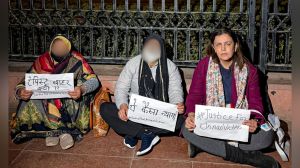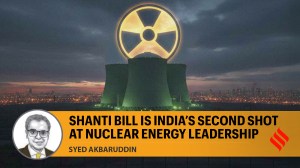Explained: Ukraine is one step closer to joining the EU. What happens next?
European Union leaders will decide whether to grant Ukraine candidate status at a summit next week. What is the requirement for joining the EU? What is the process of joining? What happens with Ukraine's application hereon?
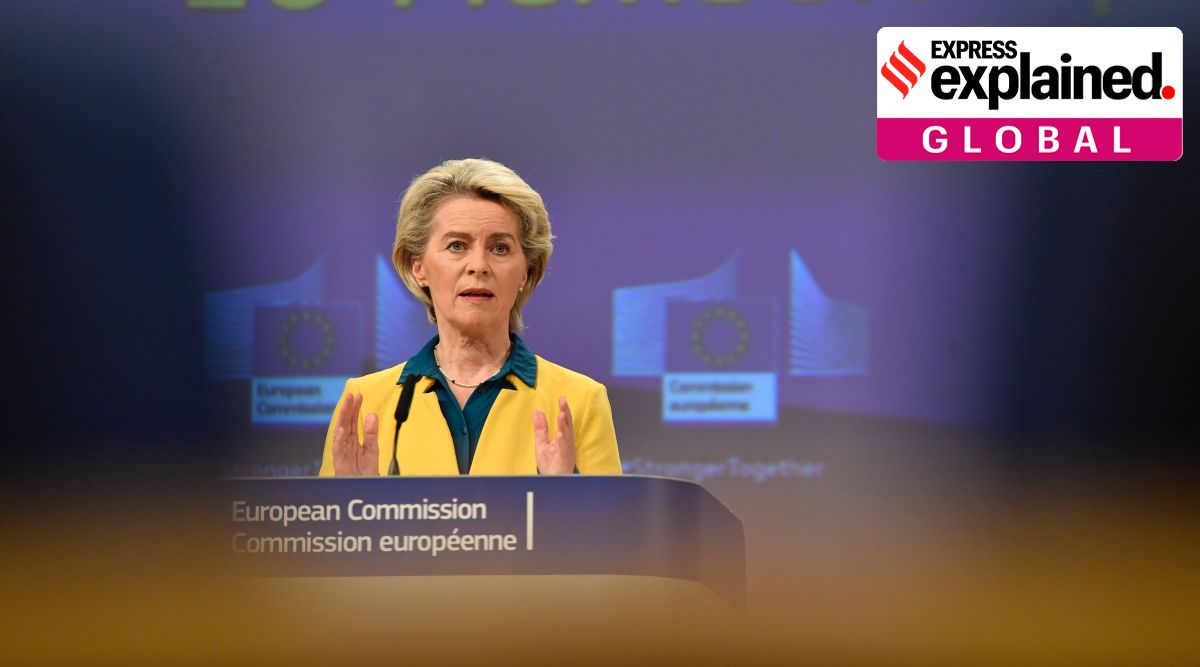 European Commission President Ursula von der Leyen speaks during a media conference in Brussels, Friday, June 17, 2022. (AP Photo/Geert Vanden Wijngaert)
European Commission President Ursula von der Leyen speaks during a media conference in Brussels, Friday, June 17, 2022. (AP Photo/Geert Vanden Wijngaert)The European Commission, the executive arm of the European Union, recommended on Friday (June 17) that Ukraine be formally granted candidate status in the EU, the first step in the long journey to become a member state of the bloc.
The announcement by EU President Ursula von der Leyen, who was dressed in yellow and blue, the colours of the Ukrainian flag, came a day after representatives of France, Germany, and Italy, the most powerful member states of the organisation, visited Kyiv for the first time, where they backed Ukraine’s bid to join the bloc.
“We all know that Ukrainians are ready to die for the European perspective,” Ursula von der Leyen said. “We want them to live with us the European dream.”
EU leaders will decide whether to grant Ukraine candidate status at a summit next week.
Ukraine’s President Volodymyr Zelenskyy tweeted, “I commend the positive European Commission Conclusion on Ukraine’s candidate status. It’s the first step on the EU membership path that’ll certainly bring our victory closer… I expect the positive result from the European Commission next week.”
What is the current relationship between Ukraine and the EU?
Four days after Russia invaded Ukraine, Zelenskyy requested the EU on February 28 to allow his country to become a member through a special procedure immediately, after which he officially signed an application for Ukraine’s membership.
Currently Ukraine, along with Moldova, Georgia, Armenia, Azerbaijan, and the Republic of Moldova are categorised under the Eastern Partnership, which formed in 2009. This joint policy partnership seeks to strengthen and deepen political and economic ties between the EU member states and the six “partner countries”.
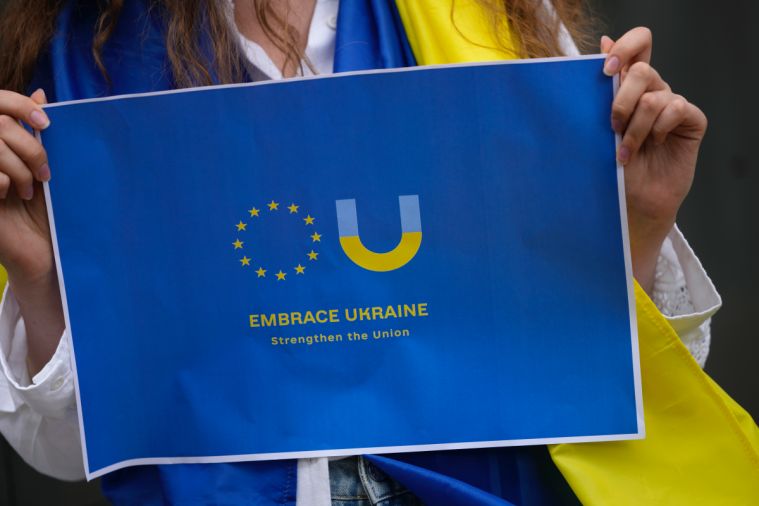 A protest in support of Ukraine joining the European Union, Wednesday, June 15, 2022. (AP Photo/Armando Franca)
A protest in support of Ukraine joining the European Union, Wednesday, June 15, 2022. (AP Photo/Armando Franca)
What is the requirement for joining the EU?
Article 49 of the EU treaties state that any European nations that seek to join the bloc, must be committed to respecting and promoting the EU’s fundamental values set out in Article 2. These include respect for freedom, democracy, equality, the rule of law, etc. After the application is received, the EU members judge the suitability of the nation on the basis of these terms.
The European Council meeting in Copenhagen in 1993 set out more specific criteria. Called the Copenhagen Criteria, these include essential conditions that all candidate countries must satisfy. Among them are a functioning market economy, a stable democracy and rule of law, and the acceptance of all EU legislation, including that of the Euro.
What is the process of joining the EU?
The procedure to gain membership of the EU consists of three stages.
In the first stage, the country is given the status of an official candidate.
In the second stage, formal membership negotiations with the candidate begin, which involves the adoption of EU law into national law, and the implementation of judicial, administrative, economic and other reforms, called the accession criteria.
Once the negotiations are completed and the candidate has met all the accession criteria, they can join the EU.
Becoming a member of the bloc involves a long and complex process. Even after candidate status is granted, the rest of the process takes years to complete. The negotiation in particular goes on for long, and its duration can vary from country to country. The EU’s most recent member Croatia joined the EU in 2013, and it took 10 years to complete the process.
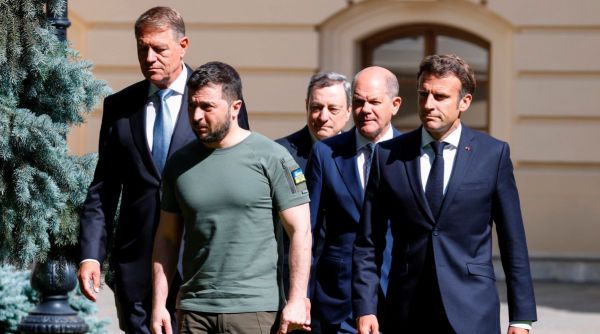 France’s President Emmanuel Macron, right, Romanian President Klaus Iohannis, left, Prime Minister of Italy Mario Draghi, center, Ukraine President Volodymyr Zelenskyy, second left, and German Chancellor Olaf Scholz in Kyiv, Thursday, June 16, 2022. The leaders of four European Union nations visited Ukraine on Thursday, vowing to back Kyiv’s bid to become an official candidate to join the bloc in a high-profile show of support for the country fending off a Russian invasion. (Ludovic Marin, Pool via AP)
France’s President Emmanuel Macron, right, Romanian President Klaus Iohannis, left, Prime Minister of Italy Mario Draghi, center, Ukraine President Volodymyr Zelenskyy, second left, and German Chancellor Olaf Scholz in Kyiv, Thursday, June 16, 2022. The leaders of four European Union nations visited Ukraine on Thursday, vowing to back Kyiv’s bid to become an official candidate to join the bloc in a high-profile show of support for the country fending off a Russian invasion. (Ludovic Marin, Pool via AP)
What happens with Ukraine’s application hereon?
Currently, the European Commission has only recommended that Ukraine (and Moldova) be granted candidate status.
This recommendation will be discussed by the EU’s 27 member states during a summit that will be held in Brussels on June 23-24. To proceed to the accession talks, all member states have to unanimously approve of the prospective country. For Ukraine’s bid to move forward, the bloc will have to agree that Ukraine has met the Copenhagen Criteria.
Negotiations (the next step) take place in an intergovernmental conference, involving ministers and ambassadors of the EU government and the candidate nation.
CNN reported concerns that Ukraine does not meet the Copenhagen Criteria yet. According to Transparency International’s 2021 Corruption Perceptions Index, Ukraine is placed 122nd on its list of 180 countries.
Some EU countries are reluctant to grant Ukraine candidate status. Denmark and Portugal have argued that if Ukraine was not at war, it would not be able to meet the qualifications for initiating membership talks, Politico reported.
Marie Dumoulin, director of the Wider Europe programme at the think tank European Council on Foreign Relations (ECFR) told Euronews, “This had to do with issues with the rule of law and with the fight against corruption in Ukraine. (These) are real issues and which the Ukrainian government itself recognises that it has to work on.”
While Ukraine might want the process to progress quickly, EU leaders have warned that the timeline would be long. In a speech at the European Parliament on May 9, France’s President Emmanuel Macron said, “We all know perfectly well that the process allowing them (Ukraine) to join would take several years — in truth, probably several decades.”
Newsletter | Click to get the day’s best explainers in your inbox
- 01
- 02
- 03
- 04
- 05












